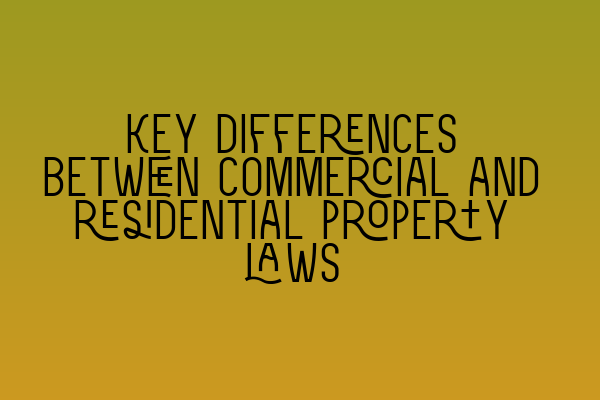Key Differences Between Commercial and Residential Property Laws
As a solicitor specialized in property law, I often come across clients who are confused about the differences between commercial and residential property laws. While both types of properties involve legal considerations, there are significant distinctions that need to be understood.
1. Purpose of Use
The first major difference lies in the purpose of the property. Commercial properties are primarily used for business or commercial activities, such as offices, retail shops, industrial spaces, or warehouses. On the other hand, residential properties are specifically designed for habitation by individuals and families.
Understanding the purpose of the property is crucial, as it determines the legal framework that applies and the regulations that need to be adhered to. Commercial properties are subject to specific zoning requirements, planning permissions, and building regulations that are different from those for residential properties.
2. Contracts and Leases
Another significant distinction between commercial and residential property laws is the nature of contracts and leases. In commercial property law, leases are typically longer-term and more complex compared to residential leases. Commercial leases often involve detailed clauses related to rent reviews, maintenance responsibilities, and assignment or subletting options.
On the other hand, residential leases are typically shorter and more standardized. In many jurisdictions, there are specific laws that protect residential tenants, such as regulations regarding security deposits, notice periods, and eviction procedures. These laws aim to safeguard the rights of individuals who occupy housing as their primary residence.
SQE 1 Practice Exam Questions
SQE 1 Practice Mocks FLK1 FLK2
3. Taxation and Financial Considerations
Commercial and residential properties also differ in terms of taxation and financial considerations. Commercial properties are subject to various taxes, including business rates, stamp duty land tax, and capital gains tax. The tax implications for commercial properties can be more complex and require specialized knowledge to navigate.
Residential properties, on the other hand, may be subject to council tax and stamp duty land tax, but the tax structure is generally simpler compared to commercial properties. Additionally, first-time buyers may benefit from certain tax exemptions or reductions when purchasing residential properties.
4. Dispute Resolution
In the unfortunate event of a dispute, the process of resolving conflicts also differs between commercial and residential property laws. Commercial disputes are often handled through commercial litigation or alternative dispute resolution methods like arbitration or mediation. These processes are designed to address complex financial, contractual, and business-related issues.
For residential properties, disputes are typically resolved through residential tenancy or housing courts. These courts specialize in handling issues related to rent arrears, eviction orders, and breaches of tenancy agreements. The focus is on protecting the rights and interests of residential tenants.
SQE 2 Preparation Courses
SQE 1 Preparation Courses
SRA SQE Exam Dates
Final Thoughts
Understanding the key differences between commercial and residential property laws is vital for clients who are involved in property transactions or disputes. Each area of law has its own unique set of regulations, requirements, and rights that must be considered. As a solicitor specializing in property law, I am here to help guide you through the complexities of both commercial and residential property matters.
For more information on property law or to explore our range of legal services, please don’t hesitate to contact us at SQE Property Law & Land Law. Our team of experts is ready to assist you with all your property-related legal needs.
